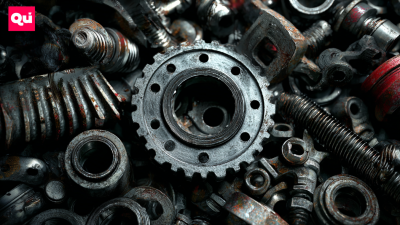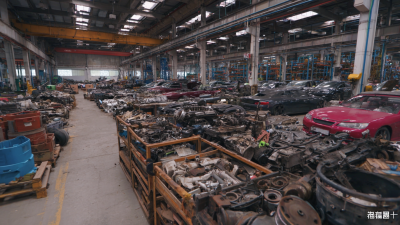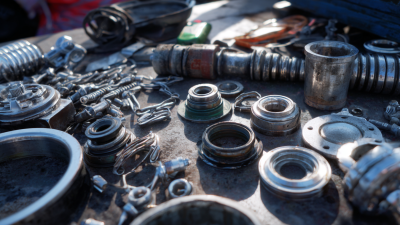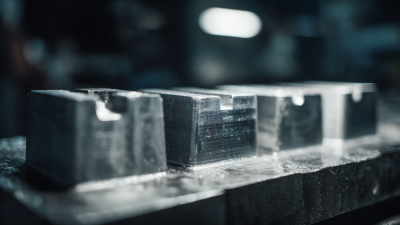Leave Your Message
-
Phone
-
E-mail
In the realm of vehicle performance and maintenance, the significance of "Other Auto Parts" often goes overlooked, overshadowed by more prominent components like engines and transmissions. However, industry reports reveal that as much as 30% of vehicle inefficiencies can be attributed to these lesser-celebrated parts, including belts, hoses, and brakes. A thorough understanding of how these components function and contribute to overall system efficiency is vital for both consumer satisfaction and vehicle longevity. According to a recent study by the Automotive Aftermarket Industry Association, the replacement and maintenance of these essential auto parts account for nearly $300 billion annually in the U.S. alone, illustrating their critical role in ensuring optimal vehicle operation. As we delve deeper into the landscape of automotive upkeep, recognizing the value of "Other Auto Parts" becomes paramount for both vehicle owners and industry professionals alike.

 The suspension system plays a crucial role in determining the ride quality and handling characteristics of a vehicle. Suspension components, including springs, shock absorbers, struts, and control arms, work together to absorb road imperfections and maintain tire contact with the surface. This not only enhances comfort for passengers but also contributes to the vehicle's stability during various driving conditions. A well-designed suspension allows for better weight distribution, reducing the risk of skidding or losing control, particularly when navigating turns or uneven terrain.
The suspension system plays a crucial role in determining the ride quality and handling characteristics of a vehicle. Suspension components, including springs, shock absorbers, struts, and control arms, work together to absorb road imperfections and maintain tire contact with the surface. This not only enhances comfort for passengers but also contributes to the vehicle's stability during various driving conditions. A well-designed suspension allows for better weight distribution, reducing the risk of skidding or losing control, particularly when navigating turns or uneven terrain.
Moreover, the quality of suspension components directly affects the responsiveness of the vehicle. High-performance parts can improve handling precision, allowing drivers to maneuver confidently while maintaining control. Conversely, worn or inferior suspension components can lead to decreased performance, resulting in a bouncy ride, increased braking distances, and poor cornering ability. Regular maintenance and timely replacement of these parts are essential to ensure optimal performance, enhancing both safety and the overall driving experience. By investing in quality suspension components, drivers can significantly elevate their vehicle's handling and comfort, creating a more enjoyable ride.
 Brake system components are crucial for vehicle safety, functioning as the primary mechanism to slow down or stop a vehicle effectively. The brake pedal, hydraulic lines, calipers, rotors, and brake pads all play vital roles in this system. Proper maintenance of these components is essential; worn pads or faulty calipers can lead to decreased stopping power, increasing the risk of accidents. Regular inspections and timely replacements can ensure that drivers maintain the highest safety standards.
Brake system components are crucial for vehicle safety, functioning as the primary mechanism to slow down or stop a vehicle effectively. The brake pedal, hydraulic lines, calipers, rotors, and brake pads all play vital roles in this system. Proper maintenance of these components is essential; worn pads or faulty calipers can lead to decreased stopping power, increasing the risk of accidents. Regular inspections and timely replacements can ensure that drivers maintain the highest safety standards.
Tips: Always check your brake fluid levels and replace them if they appear dark or contaminated. A good practice is to have your brakes inspected at least once a year, particularly as you notice changes in your vehicle's braking performance.
Moreover, understanding how different components interact can aid in preventing larger issues. For instance, if you hear unusual noises when braking, it may indicate that your brake pads are worn down or your rotors are warped. Addressing these symptoms early can prevent costly repairs and enhance your vehicle's overall performance.
Tips: Keep an eye out for vibrations or steering pulls during braking, as these can signal an imbalance in your brake system. Regularly rotating your tires can also contribute to even wear on brake components, promoting longer life and efficiency.
Engine cooling parts play a crucial role in maintaining optimal vehicle performance and preventing overheating. The primary function of these components, including radiators, water pumps, and thermostats, is to regulate engine temperature by managing the flow of coolant. Efficient cooling ensures that the engine operates within its ideal temperature range, which is vital for maximizing power output and fuel efficiency. When the engine runs too hot, it can lead to severe damage, such as warped cylinder heads or blown gaskets, thus highlighting the importance of these parts in overall vehicle maintenance.
Moreover, regular inspection and maintenance of cooling components are essential for prolonged vehicle lifespan. A malfunctioning water pump can cause coolant leaks or inadequate circulation, resulting in an overheated engine. Similarly, a clogged radiator can hinder heat dissipation, further exacerbating the risk of overheating. By proactively ensuring that engine cooling parts are in good condition, vehicle owners can enhance performance and reduce the likelihood of costly repairs. In summary, the reliability of these components significantly impacts both the efficiency and longevity of the engine, making them integral to vehicle performance and maintenance.
| Part Type | Function | Impact on Performance | Maintenance Frequency | Common Issues |
|---|---|---|---|---|
| Radiator | Removes heat from engine coolant | Prevents overheating, improves engine efficiency | Every 30,000 miles or as needed | Leaks, clogs, corrosion |
| Water Pump | Circulates coolant through the engine | Maintains optimal temperature for performance | Every 60,000 miles or during cooling system service | Leakage, impeller wear |
| Thermostat | Regulates engine coolant temperature | Ensures engine operates efficiently | Every 50,000 miles or during coolant change | Stuck open or closed |
| Cooling Fan | Directs airflow through the radiator | Aids in cooling efficiency | Check every service interval | Motor failure, blade damage |
| Coolant | Transports heat away from engine | Critical for preventing overheating | Every 2 years or 30,000 miles | Contamination, loss of effectiveness |
The fuel system plays a pivotal role in determining
engine efficiency and power output. Critical components such as fuel pumps,
injectors, and filters work
together to deliver the right amount of fuel to the engine. An efficient fuel system ensures complete combustion,
leading to improved power and reduced emissions. Regular maintenance of these parts can significantly enhance
vehicle performance, making it essential for drivers to pay attention to their fuel systems.
Tips: To maintain optimal fuel system performance,
consider using high-quality fuel and regular fuel system cleanings. Additionally, replace fuel filters according
to the manufacturer’s recommendations to prevent clogging that can hinder flow and efficiency.
Another vital aspect is the fuel injectors. They require
periodic inspection as they are responsible for delivering the fuel in a precise spray pattern. Dirty or
malfunctioning injectors can lead to poor fuel economy and sluggish engine performance. Keeping them clean
through professional services can revive your vehicle’s power output and efficiency.
Tips: If you notice a decrease in fuel efficiency
or a rough idle, it may be time to have your fuel injectors checked. Using fuel additives designed to clean
injectors can also help maintain their functionality between professional services.
Regular maintenance of electrical and ignition parts is crucial for enhancing vehicle reliability. These components, including spark plugs, ignition coils, and battery systems, play a vital role in the overall performance of an automobile. Spark plugs, for instance, are essential for igniting the air-fuel mixture in the engine; worn or faulty plugs can lead to misfires, reduced fuel efficiency, and higher emissions. Regularly inspecting and replacing spark plugs as needed ensures smooth engine operation and prolongs the vehicle's life.
Similarly, the ignition system, which includes ignition coils and wiring, must be kept in optimal condition. Any deterioration in these parts can lead to poor engine performance, resulting in stalling or difficulty in starting the vehicle. Moreover, a well-maintained battery system is important for powering various electrical components, including headlights, navigation, and safety features. Regular checks of the battery's condition and connections can prevent unexpected breakdowns and improve the car's overall reliability. By prioritizing the maintenance of these electrical and ignition parts, vehicle owners can ensure more dependable performance and a more efficient driving experience.






